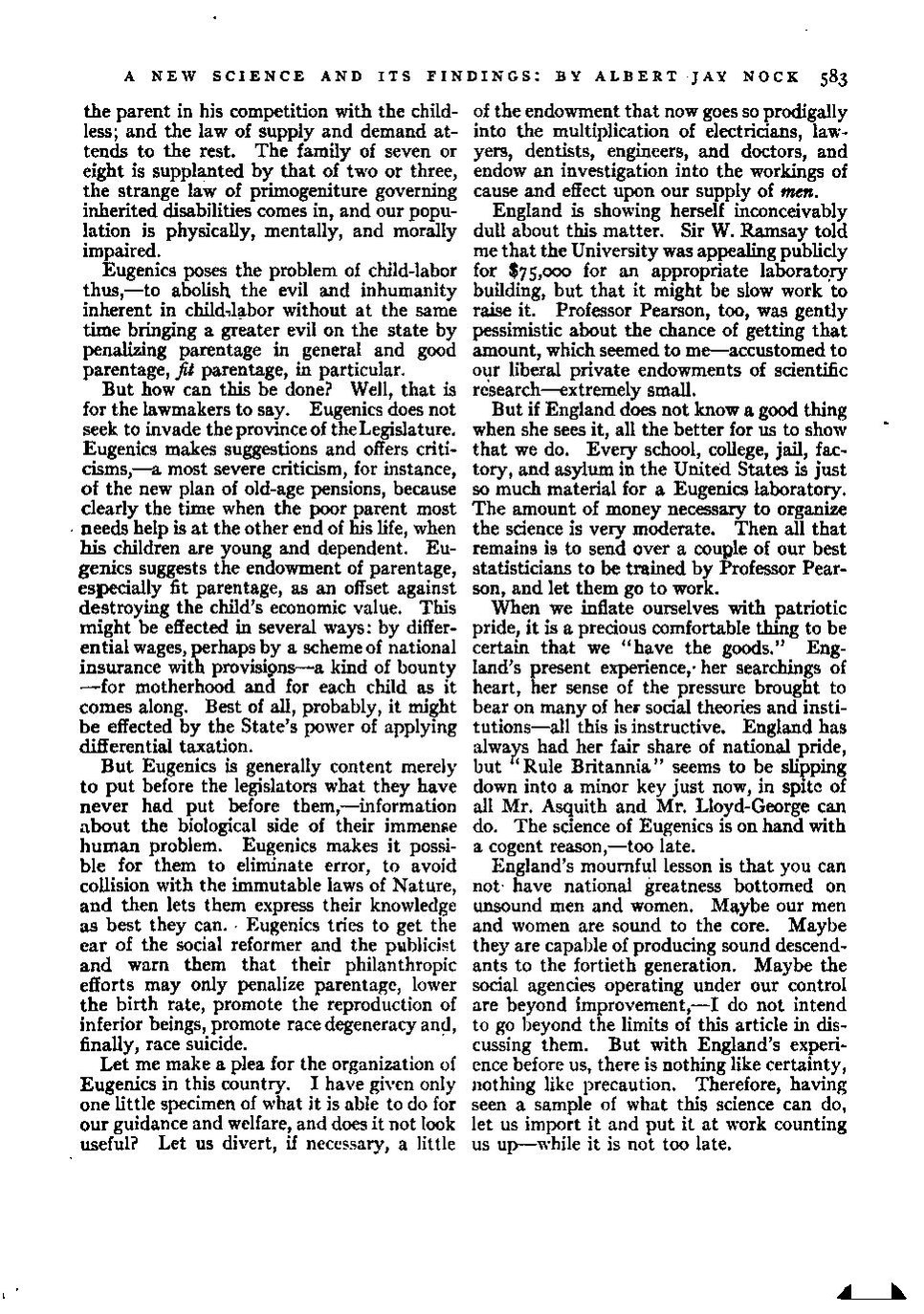the parent in his competition with the childless; and the law of supply and demand attends to the rest. The family of seven or eight is supplanted by that of two or three, the strange law of primogeniture governing inherited disabilities comes in, and our population is physically, mentally, and morally impaired.
Eugenics poses the problem of child-labor thus, — to abolish the evil and inhumanity inherent in child-labor without at the same time bringing a greater evil on the state by penalizing parentage in general and good parentage, fit parentage, in particular.
But how can this be done? Well, that is for the lawmakers to say. Eugenics does not seek to invade the province of the Legislature. Eugenics makes suggestions and offers criticisms, — a most severe criticism, for instance, of the new plan of old-age pensions, because clearly the time when the poor parent most needs help is at the other end of his life, when his children are young and dependent. Eugenics suggests the endowment of parentage, especially fit parentage, as an offset against destroying the child's economic value. This might be effected in several ways: by differential wages, perhaps by a scheme of national insurance with provisions — a kind of bounty — for motherhood and for each child as it comes along. Best of all, probably, it might be effected by the State's power of applying differential taxation.
But Eugenics is generally content merely to put before the legislators what they have never had put before them, — information about the biological side of their immense human problem. Eugenics makes it possible for them to eliminate error, to avoid collision with the immutable laws of Nature, and then lets them express their knowledge as best they can. Eugenics tries to get the ear of the social reformer and the publicist and warn them that their philanthropic efforts may only penalize parentage, lower the birth rate, promote the reproduction of inferior beings, promote race degeneracy and, finally, race suicide.
Let me make a plea for the organization of Eugenics in this country. I have given only one little specimen of what it is able todo for our guidance and welfare, and does it not look useful? Let us divert, if necessary, a little of the endowment that now goes so prodigally into the multiplication of electricians, lawyers, dentists, engineers, and doctors, and endow an investigation into the workings of cause and effect upon our supply of men.
England is showing herself inconceivably dull about this matter. Sir W. Ramsay told me that the University was appealing publicly for $75,000 for an appropriate laboratory building, but that it might be slow work to raise it. Professor Pearson, too, was gently pessimistic about the chance of getting that amount, which seemed to me — accustomed to our liberal private endowments of scientific research — extremely small.
But if England does not know a good thing when she sees it, all the better for us to show that we do. Every school, college, jail, factory, and asylum in the United States is just so much material for a Eugenics laboratory. The amount of money necessary to organize the science is very moderate. Then all that remains is to send over a couple of our best statisticians to be trained by Professor Pearson, and let them go to work.
When we inflate ourselves with patriotic pride, it is a precious comfortable thing to be certain that we “have the goods.” England's present experience, her searchings of heart, her sense of the pressure brought to bear on many of her social theories and institutions — all this is instructive. England has always had her fair share of national pride, but “Rule Britannia” seems to be slipping down into a minor key just now, in spite of all Mr. Asquith and Mr. Lloyd-George can do. The science of Eugenics is on hand with a cogent reason, — too late.
England's mournful lesson is that you can not have national greatness bottomed on unsound men and women. Maybe our men and women are sound to the core. Maybe they are capable of producing sound descendants to the fortieth generation. Maybe the social agencies operating under our control are beyond improvement, — I do not intend to go beyond the limits of this article in discussing them. But with England's experience before us, there is nothing like certainty, nothing like precaution. Therefore, having seen a sample of what this science can do, let us import it and put it at work counting us up — while it is not too late.
